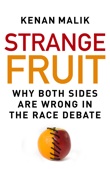
Strange Fruit
Why Both Sides Are Wrong in the Race Debate
Malik, Kenan
Publisher: Oneworld
Year Published: 2008
Pages: 341pp Resource Type: Book
Cx Number: CX7892
Malik makes the case that most anti-racists accept the belief, also held by racialists and outright racists, that differences between groups are of great importance. While racialists attribute the differences to biology, anti-racists attribute them to deep-rooted cultural traditions which are typically seen as inherent in the group. Malik argues that these positions are actually quite similar, and makes the case that racism and racial inequality are best combatted by focusing not on our differences but on what unites us. Malik also strongly criticizes the cultural relativism of many anti-racists, and their increasing tendency to reject science as some kind of western imperialist conspiracy to oppress the rest of the world.
Abstract:
Kenan Malik's Strange Fruit discusses many of the complicated issues surrounding the role of race in science and scientific thinking. As well as providing a background history of how the ideas of race developed over time, Malik's work explores the impact and legitimacy of a variety of modern scientific studies and approaches, presenting both the positive and negative aspects in which scientific research has interacted with race. The idea of race has been avidly debated from different points of view since the eighteenth century and Malik discusses why he believes both sides are incorrect. The author presents the follies of each approach and traces the role of race in science and thought from Enlightenment thinkers to present-day sociologists, anthropologists and biological scientists.
Malik's study reveals how ostensibly anti-racist thinking may prevent advancement in certain areas of research and act as the antithesis to scientific rationality. To illustrate the issue, Malik points to disease research and the human genome project. However humans are defined conceptually, there are nonetheless greater similarities and characteristics between groups of people with similar DNA and genetic properties. Even though race may seem taboo in the twenty-first century, Malik believes there are still practical applications where differences and similarities within the human genome may benefit the health and well being of individuals.
An excellent chapter in Strange Fruit discusses the Kennewick Man incident and the questions that arose from the remarkable discovery of the nine thousand year old skeleton. The debate about the Kennewick Man "gets to the heart of many of the issues that run through this book. What is race? How do we define cultural identity? Who owns knowledge? Who defines history? What is the role of science in contemporary society?" The Kennewick Man provoked a heated debate between scientists wishing to study the remains and Native Americans who believed an ancestor's grave was being desecrated. The pursuit of scientific advancement clashed with the beliefs of a traditional culture resulting in a heated legal and political battle. Along with the possibility that the skeleton may have been of European decent, the incident caught tremendous attention from the scientific community as well as the general public.
Strange Fruit confronts many of the difficult issues present in modern scientific debates and provides readers with an in-depth historical background to the role race has played in science since the sixteenth century. As a rationalist, Malik's discussion presents several interesting perspectives and challenges readers to understand why controversial areas of research should not be restrained by political, cultural or racial barriers. Malik believes that "The concept of race is irrational. The practice of antiracism has become so [and] We need to challenge both, in the name of humanism and reason."
[Abstract by William Stevenson]
Table of Contents
Acknowledgments
Foreword: race, Science and James Watson
1. The People's Genome
2. Should Science be Colour-Blind
3. There be Monsters
4. Enlightened Man
5. The Romance of Type
6. To Make an Accomplice of Nature
7. The Burden of Culture
8. Who Owns Knowledge?
9. Ancient Race Wars and Modern Race Science
10. The End of Utopia and the Return of Race
Afterword: Beyond Race and Unreason
Notes and References
Bibliography
Index
Subject Headings


